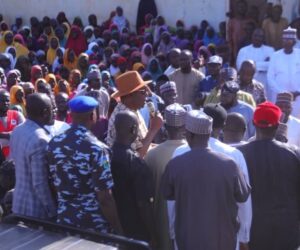By Muideen Olaniyi, Haruna Ibrahim, Seun Adeuyi, Musa Luka Musa, (Abuja), Ibrahim Musa Giginyu, Sani Ibrahim Paki (Kano), Mumini Abdulkareem (Ilorin)
As the United Nations marks the World Suicide Prevention Day (WSPD) today, the Nigerian government has been alerted to the rising cases in Nigeria.
SPONSOR AD
The WSPD’s the triennial theme for 2024–2026 is ‘Changing the Narrative on Suicide.’
Psychiatrists, psychologists and mental health professionals, in separate interviews with Daily Trust, identified reasons suicide is on the rise in the country.
A data analysis by Daily Trust of cases reported by national dailies in Nigeria indicated that 367 citizens committed suicide within the last seven years.
Eighty seven suicide cases were reported in the country in 2019, fifty five in 2020, forty three in 2021, sixty eight in 2022, forty one in 2023, forty five in 2024 and twenty eight so far in 2025.
Hardship, domestic violence, toxic workplaces cited
A mental health professional, Dinma Amadi, described suicide as a “silent epidemic” in Nigeria, warning that the country risks losing more lives unless it takes urgent action to address mental health challenges.
“No one in their right mind is genuinely happy to die. Suicide in itself is an end product. It came from a sickness of the mind, and we must acknowledge that it is as valid as sickness of the body,” she said.
Amadi identified economic hardship, unemployment, relationship breakdowns, domestic violence, and toxic workplaces as major drivers behind the rising trend. “Despite growing awareness, suicide cases are increasing, and the reasons are complex and interconnected,” she said.
She explained that young people are increasingly vulnerable due to academic pressures, cyberbullying and a lack of emotional support, while untreated mental health disorders such as depression, anxiety, bipolar disorder, and substance abuse worsen the situation.
“If malaria goes untreated for a long period, the patient becomes prone to acute malaria and eventually death. In the same way, if depression goes untreated, the person becomes vulnerable to suicidal thoughts, which is very risky.
“Cultural and religious beliefs often label suicide as a moral failing, discouraging people from seeking help. I have seen people dying in silence because their religion indirectly shames them into not speaking up. But after finding help, many of them became even better in their relationship with God,” she said.
“Nobody wants to be tagged ‘mad,’ but if we create a safe space in solidarity, it becomes easier for people to speak up and get better,” she added.
She called on families to listen without judgment and encourage therapy, while communities should organize awareness programs in schools, churches, and mosques.”
Amadi called on the government to take decisive steps, starting with the decriminalization of attempted suicide. “Punishing survivors only deepens trauma and discourages help-seeking. We are working in reverse, and there is no improvement with that,” she said.

‘Mental health conditions fueling suicide’
Speaking to Daily Trust, a consultant psychiatrist, Dr Chukwudi Charles Elonu, said education is one of the most effective ways to prevent suicide, stressing that addressing underlying mental health conditions is crucial.
Elonu, who is the Clinical Director at Synapse Services Azalea, Centre for Psychological Medicine, Abuja, said awareness helps people recognise early warning signs and seek help before suicidal thoughts set in.
“One of the most effective ways to prevent suicide is through education. When people are educated about the factors that can lead to suicidal thoughts, they become better equipped to recognize early warning signs,” he said. “For example, someone who begins to feel depressed may be able to identify it as a problem and seek help, rather than allowing it to progress to suicidal thinking.”
He noted that suicidal ideation is not a diagnosis but a consequence of untreated or poorly managed mental health conditions.
“You don’t treat suicidal thoughts directly; what you treat are the underlying issues such as depression, psychosis, or anxiety. Once these conditions are properly managed, suicidal thoughts often subside,” Elonu said.
He urged Nigerians to pay closer attention to mental health, saying, “early intervention is key to reducing preventable deaths linked to suicide.”
On her part, a behavioral scientist at the University of Ilorin Teaching Hospital (UITH), Dr Elizabeth Ebigbagha, said: “Suicide can be impulsive, when people act without thinking because of challenges such as job loss, broken relationships, or hopelessness. It can also be linked to personality disorders, especially borderline personality disorder, where people are more prone to suicide attempts because of unstable moods, emptiness, or fear of abandonment.
“The low detection rate of depression until it results in suicide or a failed attempt is worrying. A failed suicide attempt is not something to dismiss, because it usually shows the person has been ill for a long time with feelings of worthlessness and hopelessness. Such a person must see a psychiatrist.
“Suicide could also be caused by psychosis, where people experience abnormal mental functions such as hearing voices commanding them to kill themselves. In such cases, they feel they cannot control their actions. Substance abuse is another major factor, leading to poor judgment and reckless decisions.”
On the role of the media, she warned, “While media coverage can create awareness, it can also expose vulnerable people to harmful methods. Some even learn from films or online content how to carry it out. If media content is not controlled, it could increase suicide attempts. The media should place more emphasis on the causes of suicide rather than just reporting the events.”
She stressed the need for stronger awareness campaigns and reduced stigma. “Before now, HIV carried serious stigma, but awareness has made people more open, reducing discrimination. The same should be done for mental illness, because anyone can have it. We must all understand this fact.”
‘What govt should do’
A Kano-based sociologist, Dr Maikano Madaki, who lectures at Bayero University Kano (BUK), Department of Sociology, said some of the reasons advanced by scholars and researchers for suicide include depression, frustration and aggression.
“There are many social, political, economic, and health problems that are exposing people to the dangers of committing suicide because of the situations they experience in their lives that are not friendly to them, or they are not happy with them, or they are not satisfied with them, or they are frustrated about them.
He said: “It has been noticed that in recent times, the increase in the rate of suicide in the world is largely among people who have terminal illnesses. When they have certain underlying health challenges, they lose hope. And sometimes because of the frustrations and pain people are in, they now prefer to take away their own personal lives for such reasons.
“In Africa, we also have our own share of that, but we are not the leading country. Côte d’Ivoire happens to be the leading country in the records of suicide annually. Over one million people in the world are taking their lives every year in the last 10 years. And that is alarming because you begin to wonder why people have to be taking their own lives.
“Again, when you look at it from gender orientation, committing suicide tends to be higher among men, but attempts to commit suicide are higher among women.”
On ways to prevent suicide, the don identified preventive and control measures.
“To prevent suicide, you have to give proper, adequate, but quality orientation, socialization, and education to the citizens. Let each and every person get to know what is right and what is wrong. Let people have equal chances and opportunities to pursue life chances. Let there be a level playing field for each and every citizen.
“Another preventive measure is by making all the necessary social amenities available and easy to access by each and every citizen, the poor and the rich. Also, there has to be an established system of tracking early warnings among citizens, especially among the underprivileged who are probably suffering from one problem or the other. That problem can be a social, economic, or political health problem,” he said.
Fred Simon Auta of the Society for Social Justice of Nigeria (SSJN), said, “If you do a simple arithmetic, you will find out that in the Northern part of Nigeria, there have not been rampant cases of suicide but that of suicide attempt, and this is rooted in the region’s socio-cultural affiliation. Unfortunately, by Nigerian standards, a suicide attempt is a crime, and victims have to live with the label after being prosecuted, and that label kills them faster.”
He said it is unfortunate that studies in Nigeria often highlight the indirect effects of corruption, such as economic instability, poverty, and social inequality, and a direct effect such as the mismanagement of public funds by corrupt officeholders. He, however, said that the real genesis is attributed to disappointment in life.
Clerics weigh in
An Islamic cleric and Senior Lecturer, Department of Economics, Al-Hikmah University, Ilorin, Dr Abdurrauf Babalola, stressed the need for religious bodies in Nigeria to instill the fear of Allah in potential suicide victims, adding that Islamic counseling, access to treatment, and support networks within family, friends and community are crucial.
He said conditions like depression and anxiety could be managed effectively with help, while recovery from trauma is achievable with the right support and therapy.
“Building connections can combat feelings of loneliness and improve well-being. Resolving conflicts can strengthen relationships and provide emotional support. Treatment for substance misuse can reduce suicidal thoughts and enhance health. Proper care can improve quality of life in managing chronic conditions. Community resources can assist in overcoming financial difficulties. Support networks can help process grief and facilitate healing,” he said.
Another Islamic scholar, Ustadh Sulyman Hussayn Onitira, said: “Anybody that commits suicide will not only be cast into the fire, such a person will continuously find himself using whatever means he employed to take his life against himself inside the fire, be it rope, gun, poison, or any other thing.
He said Islam regards life as a sacred trust from Allah and no individual has the right to end it. According to him, the Qur’an makes it clear that it is Allah alone who gives life and takes it, and that believers are enjoined to exercise patience during trials rather than resorting to self-destruction.
Venerable Daniel Ozovehe of the Anglican Diocese of Kubwa, attribute the rising cases of suicide in Nigeria to depression, anxiety, economic hardship, guilt and abusive relationships.
“Many people are depressed and think the best thing to do is to just end it all. Others are weighed down by anxiety, worry, and fear. Some are struggling with poverty, unemployment, and lack of food. There are also those battling guilt, shame, loss of self-worth, and even drug abuse,” he said.
He said abusive marriages and toxic family environments also push many into hopelessness, making them see suicide as an escape route. On possible solutions, the cleric emphasized the need for prayer, counseling, and open communication. He advised families and communities to create safe spaces where people can freely express their struggles without fear of judgment.
“Don’t shout on them or force them to be silent. Allow them to speak their mind so you can hear from them and help them. My advice to Nigerians is, when you are going through depression or anxiety, don’t keep quiet. Speak out so that you can get help, because there is hope for you and a better tomorrow,” he urged.
He called on Nigerians to embrace regular mental health checks, show compassion, and extend love to those facing distress. Quoting the Bible, he reminded citizens of God’s enduring care and promise of a hopeful future.
The cleric also appealed for more empathy in society, saying, “People are going through a lot. Please don’t add to their problems. Show love, show support, and show compassion.”








